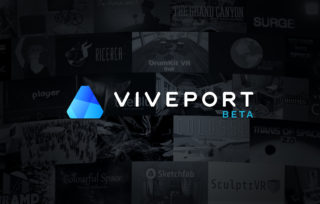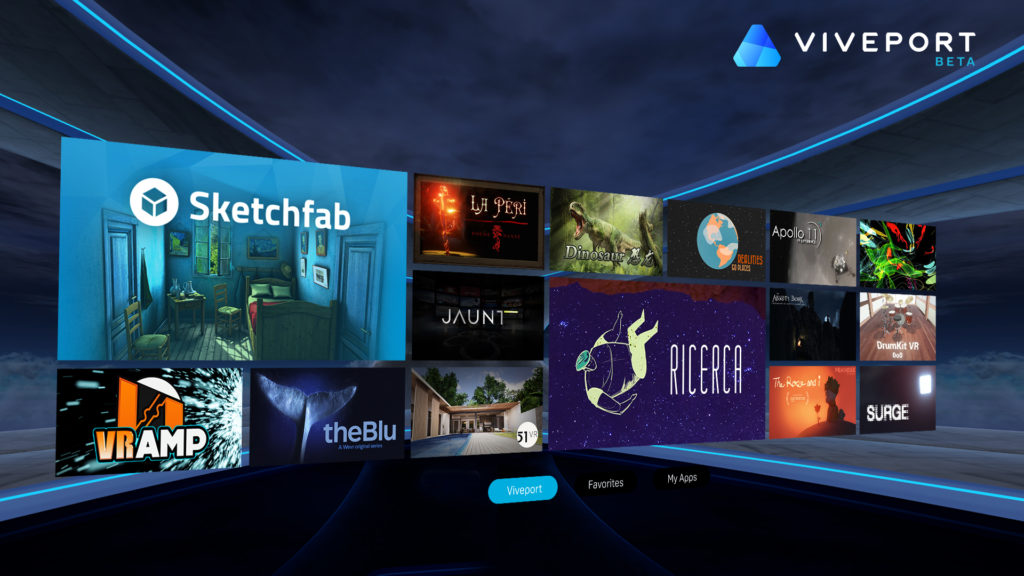In a move designed to empower developers to drive long-term engagement with customers and accelerate the support of virtual reality around the world, HTC will be launching Viveport this fall, it’s new global app store dedicated solely to VR.
HTC wants to democratize access to experiences where anyone can learn anything, travel anywhere and experience anything imaginable via Viveport by featuring a fast-growing selection of apps and experiences across education, design, art, social, video, music, sports, health, fashion, travel, news, shopping, creativity tools and more. Viveport will amp up the non-gaming VR content pipeline and complement the SteamVR platform, which is predominantly geared toward gaming-related apps.
The Viveport store—slated to be available in Vive headsets, web browsers and as a PC and mobile app—will feature pay-to-download, in-app-purchases, subscriptions and other revenue-generating opportunities.
Rikard Steiber, formerly Google’s global marketing director of mobile and social advertising, is now plying his trade as a senior vice president of virtual reality for HTC managing the global Viveport VR app store business, and mentoring Vive X companies. He joined [a]listdaily to explain why VR will be the next big computing platform.

Why was it so important for HTC to focus on building business in verticals outside of gaming?
We believe VR will change the world for consumers and business alike. We want to make VR available for everyone. I think the initial content has been focusing on games and entertainment, so it’s become widely available. What we want to do now is help all the other developers and creators to reach out globally with their content and build a business. But at the same time, we’ve seen users creatively teaching via video to businesses and brands. We also want to figure out how can we engage with VR. This gives them a good platform to find that content and then find the new uses, which also makes VR more accessible and relevant to everyone.
What are the interesting opportunities VR has for business applications?
What’s interesting is that when people put on an HTC Vive headset, they get this religious experience. It doesn’t matter if they’re a teacher or an artist or a doctor or an engineer. Suddenly they say, ‘ok, I can teach how to do medical procedures in VR, and it’s less risky,’ or ‘I can make complex engineering together with my colleagues,’ or ‘I can teach my kids in a much more immersive way.’ I don’t think that we have understood all the applications yet, but I can see when we talk to people that their eyes light up and they can see all these new applications for pretty much any industry project. What we learned is that any new computing platform that’s coming, whether its PC, web or mobile, it all starts with communication and entertainment gaming services. But it wasn’t games that made PC, web and mobile big. I think now with VR, it’s starting with the early adopters, but essentially it’s going to be these new categories around experiences of education, or creativity, software, social media, video and also brands of commerce. That’s what it’s going to be when it hits mainstream.
What is your favorite non-gaming VR application that you’d like to see more content being produced for?
I have two girls, ages 6 and 10, so our job as parents is very much to keep them excited and motivated about school—they can now explore. If you can immerse yourself, if you can walk with the dinosaurs in Jurassic Park and then have your teacher tell you about the T-Rex or the stegosaurus, that’s going to be a more immersive and memorable experience that they’ll never forget in their life. If we can get them excited about geography, or mathematics, or all these other topics and actually remember it better, that’s very powerful.

How would you assess the current VR scene across the globe?
I think it’s interesting—creativity comes from everywhere. I think the US is a very strong market in a way. I think there are very strong markets in Japan and China. There’s a lot of creativity across all markets. What we want to do with HTC Vive is help users find all this great content out there because it’s kind of hard to find them directly.
What are some challenges HTC Vive will have to overcome to be a leader in this industry?
We’re focusing on helping the developers, creators and brands to reach out with their VR experiences and build a business. At the same time, we focus on a lot of user experience. We try to ensure the best experience, like where rooms can move around and interact with objects, and also make that experience available to everyone. That’s sort of both sides of it, having great content and having the technology to make something available to everyone.
What is the most organic way for brands to use VR?
If you think about brands today, they’re all doing content and content marketing. I think it’s a great opportunity for brands to be innovative and to embrace this technology because many big corporations were probably skeptical at the beginning of computers, or even the web, or even mobile. Now of course, they’re living their lives on their applications or services and training in computers. I think for an enterprise, it’s not just engaging with consumers, but collaborative working in the company—it’s going to be training. There’s going to be so many functions of the corporation that’s going to be able to take advantage of VR technology. There are three things really important for brands. First of all, if you want to have a brand experience, this is the most immersive experience you can have. Second is education—VR makes it much more memorable because you’re going to interact with it. Your recall from VR is going to be much higher than looking at a print or banner ad, or whatever you’re doing today. Third, if you actually touch an object on a shelf, you’re much more likely to pay for it. If you just imagine touching a product, you’re much more likely to make a purchase. Brands can build relationships in VR between products and consumers in a new way and actually drive business forward.
Follow Manouk Akopyan on Twitter @Manouk_Akopyan

